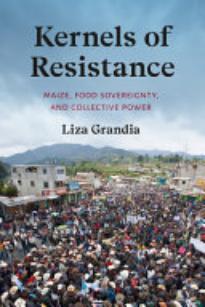2018 School Spending Survey Report
Kernels of Resistance: Maize, Food Sovereignty, and Collective Power
COPY ISBN
 Grandia’s (Indigenous studies, Univ. of California, Davis; Enclosed: Conservation, Cattle, and Commerce Among the Q’eqchi’ Maya Lowlanders) well-crafted book about the importance of food sovereignty educates readers about the strengths of Indigenous sustainable agriculture in the Global South and the corporate domination of agriculture. Grandia relates her own early work in Northern Guatemala as an anthropologist, along with her visits to the fields with local farmers where maize, beans, and squash are grown without pesticides. The most powerful part of her book is the story she tells about the many Indigenous coalitions that developed rapidly over the imposition of the Monsanto Protection Act, which allowed breeders exclusive rights to continue growing GMO crops even if a court ruled against it. Guatemala was one of a few nations to have banned all genetically modified crops, but as the world was focused on the start of the World Cup in the summer of 2014, the Guatemalan Congress secretly passed a law to legalize GMOs and criminalize traditional seed-saving practices.
Grandia’s (Indigenous studies, Univ. of California, Davis; Enclosed: Conservation, Cattle, and Commerce Among the Q’eqchi’ Maya Lowlanders) well-crafted book about the importance of food sovereignty educates readers about the strengths of Indigenous sustainable agriculture in the Global South and the corporate domination of agriculture. Grandia relates her own early work in Northern Guatemala as an anthropologist, along with her visits to the fields with local farmers where maize, beans, and squash are grown without pesticides. The most powerful part of her book is the story she tells about the many Indigenous coalitions that developed rapidly over the imposition of the Monsanto Protection Act, which allowed breeders exclusive rights to continue growing GMO crops even if a court ruled against it. Guatemala was one of a few nations to have banned all genetically modified crops, but as the world was focused on the start of the World Cup in the summer of 2014, the Guatemalan Congress secretly passed a law to legalize GMOs and criminalize traditional seed-saving practices.
VERDICT This book offers a valuable lesson about the street protests and organizational efforts between rural and urban groups to fight the Monsanto law, which was overturned soon after the protests. That’s one of the many factors that make this book a powerful, hopeful work.
RELATED
ALREADY A SUBSCRIBER? LOG IN
We are currently offering this content for free. Sign up now to activate your personal profile, where you can save articles for future viewing




Comment Policy:
Comment should not be empty !!!